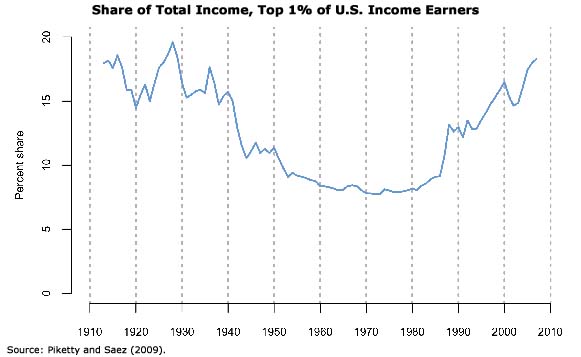October 18, 2011
The #occupywallstreet protests in New York City – and those around the country – have sparked a much-needed dialogue about inequality in the United States. The level of inequality in our economy has been growing for decades, and has reached a level not seen since prior to the Great Depression:

In a research paper from 2009, CEPR Senior Economist John Schmitt took a careful look at this sorry state of affairs and concluded that it “is not due to chance circumstances but is the direct result of a set of policies designed first and foremost to increase inequality.” CEPR Co-Director Dean Baker’s most recent book, The End of Loser Liberalism: Making Markets Progressive, examined the role of the government in “structuring the market in ways that ensure that income will flow upwards” and argues that progressives need to focus on preventing this, rather than acting after the fact on ways to re-redistribute income.
Going hand in hand with inequality is poverty, and CEPR Senior Research Associate Shawn Fremstad has written extensively on both of these subjects. In his most recent CEPR paper, he talked about how to frame the discussion on poverty. Previously, he examined how poverty is measured in the U.S. and concluded that the current poverty measure “is outdated and has failed to keep up with public consensus on the minimum amount of income needed to ‘get along’ in the United States in the 21st Century.” He also looked at competing measures and presented one that was inclusive and more aligned with current views on poverty.
In related work, CEPR recently co-sponsored an event on “Jobs, Inequality, and the Public Sector: Improving the Economic Competitiveness and Innovative Capacity of the U.S.”, Schmitt summarized two reports on economic insecurity by the Institute for Women’s Policy Research, and Fremstad reminded National Review Editor Rich Lowry of what “a more substantive conservative intellectual” had to say on the topic of the social contract and taxes.
For more of our work on inequality and poverty, please go here.






